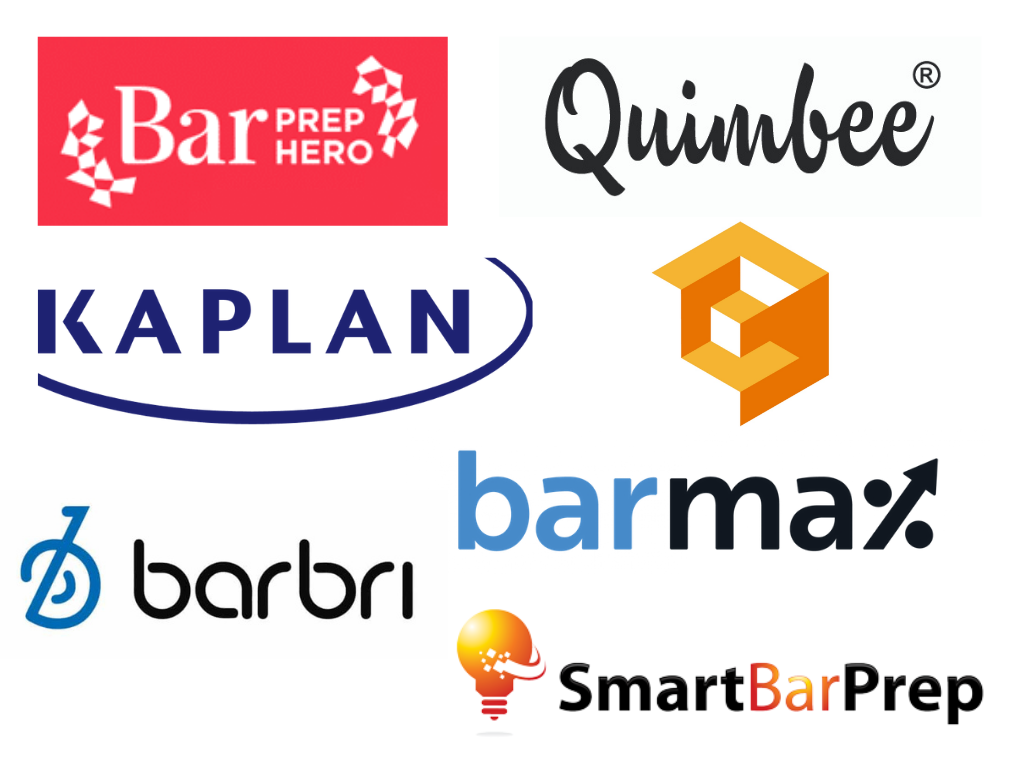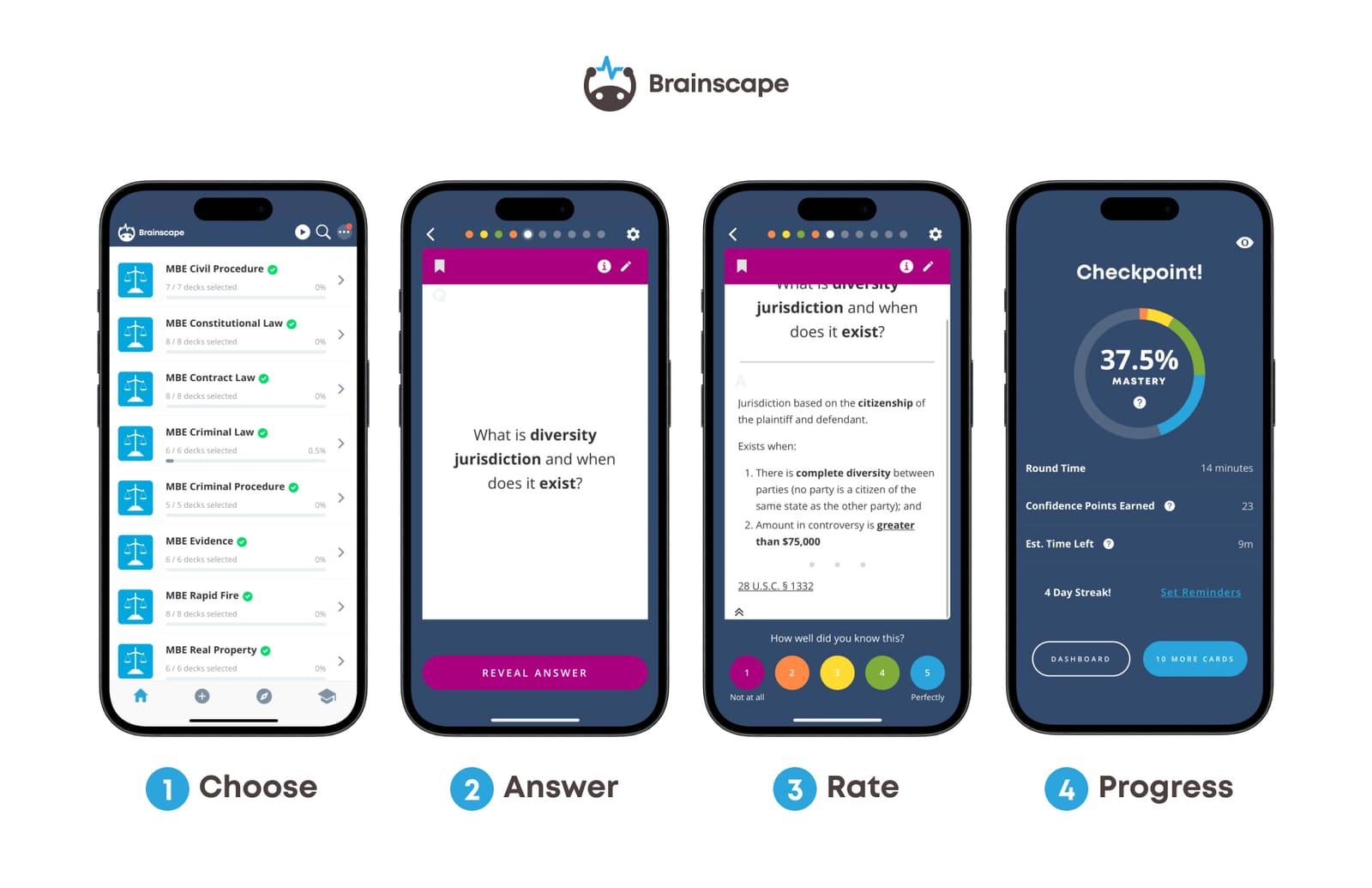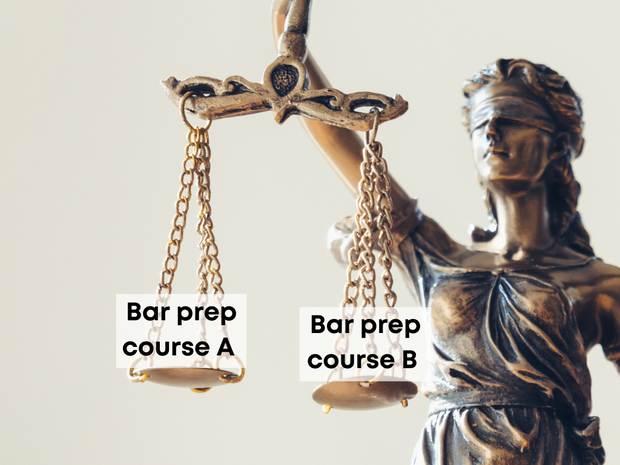You’ve just wrapped up your final year of law school and now you’re staring down the barrel of the Multistate Bar Exam insert dramatic orchestral music here. This means two things: you’ve got to (1) say “bye-bye” to your social life and (2) choose a bar exam prep course to help you prepare for the biggest exam of your life...life...life...life.
Now, although all bar review courses are designed to do the same thing—help you pass the MBE—each one has something unique to offer.
Some are delivered in brick-and-mortar classrooms, while others are fully virtual; some have a fixed daily schedule, while others are more flexible; and some offer special features like progress metrics, materials based on past bar exams, and one-on-one individualized tutoring, while others provide the bare bones of what you need (with a much lesser price tag).
But the best bar review course isn’t necessarily the one with all the bells and whistles … it’s the one that:
- is best suited to the way you like to learn,
- iou can afford,
- gives you the greatest chance of passing!
With these core principles in mind, the team here at Brainscape plundered the minds of our panel of legal experts. We wanted their in-the-trenches advice on how to do a bar review course comparison and choose the best bar prep course. Their input and advice, coupled with a thorough rogering of the Internet’s fathomless resources, inspired this very guide that you now hold in your hands!
Which Bar Course Is The Best?
Here’s a shocker … bar exam prep can actually be fun! After the rigors and demands of law school—daily lectures, case briefings, and an endless firehose of information—being able to sit back and process it all can be a much-welcome change of pace. And if you really want to, you can do this all in the comfort of your own bedroom (wearing your favorite unicorn onesie).
First, however, you need to figure out how YOU learn best so that you can pick the best bar review course to suit your lifestyle and learning needs ...
Figure Out What You Need To Do Well
Most of the big-name bar exam review courses, like Kaplan, BarBri, BarMax, etc., are essentially very good. They’re popular for a reason: they’ve helped hundreds of thousands of law students pass the bar exam.
However, they can also be on the costlier end of the spectrum, thanks to the comprehensiveness of their offering, which can include video lectures, study notes, practice test banks, flashcards, one-on-one tutoring, fully fleshed bar prep plans, and more.
That’s great! But you may not NEED all of that. You may also already be burdened by law school debt. So before you even do a bar review course comparison, think about what YOU need (and don’t need) in order to take on the MBE …
- Do you learn better in a brick-and-mortar classroom? Or do you prefer the solitude of your bedroom and the virtual environment?
- Do you require one-on-one tutoring and individualized feedback? Or are you perfectly happy with more independent study and template answers?
- Would you prefer a flexible, independent study schedule, or do you need a stricter structure and daily schedule to be productive?
- Is this your first time taking the bar? Or have you already taken (and failed) it and so are looking for a course that offers more one-on-one help and question practice?
- What area of the bar are you most concerned about? Is it content memorization, or do you need more assistance with writing good bar exam essays?
If you don’t feel that you need all the bells and whistles, there is a bevy of more affordable review courses out there. In fact, even some of the industry giants we mentioned also offer fewer-frills bar exam prep courses.
The point is, you have options! But your first step is to figure out how you learn best and what you need to be successful. Know yourself, your lifestyle, and what study habits work best for you, and choosing the best bar prep course for you will be much easier.
Do A Comparison Of Bar Review Courses

Your next step is to look for the bar exam prep courses that meet the criteria you laid out in the previous step, AND are of decent quality and reputation.
The best way to gauge quality? Look at their pass rate. In other words, what percentage of the students who enroll for this review course go on to pass the MBE? If only 50% of the law students who took that course passed, it could be that they don’t offer the right support and practice resources to adequately prepare students. And you ain't got time for dat.
There are two ways you can figure out the pass rate of a bar exam prep course:
- Check out their website (it should be advertised somewhere) or contact them directly to enquire.
- Look at their online ratings and read the reviews of law students who have taken their course/s in the past.
From a statistical perspective, the ones with the highest pass rate are obviously the best bar prep courses for most students.
Some other criteria to consider include:
- Where did the bar exam prep course get its content, test prep plan, and question banks/practice exams from? (Always give preference to those who source their materials from the National Council of Bar Examiners and from past bar exams.)
- Are the lecturers, instructors, and/or tutors trusted experts who have an intimate understanding of how the bar works? (It takes more than just being a lawyer—i.e., passing the bar once—to truly understand the nuanced challenges and voice of the MBE.)
- Does the bar exam prep course you’re considering use metrics to constantly show your progress and help you identify knowledge weaknesses? (This is a key difference between a cookie-cutter approach to assisting students, versus helping the individual to manage their time better and attack their weaknesses.) *
- BONUS: Some bar prep courses offer you your money back if you don’t pass, which takes some of the sting out of having to retake the MBE.
As we touched on earlier, you’ll also find during your bar review course comparison that many companies offer different packages with varying levels of features, interactiveness, and benefits. So you can very well choose a self-study, virtual option with a big name like Kaplan, or go the full hog and sign up for their in-person classroom experience. Both are administered by Kaplan but have different price tags.
* These additional features may point you towards more expensive bar exam prep courses. However, there is a way you can benefit from these features, while also securing yourself an incredibly effective MBE study tool … and all for the price of a latté!
We are, of course, talking about digital flashcard apps like Brainscape and Anki. These adaptive learning flashcards use spaced repetition to hammer you on the key concepts you MUST know well to pass the MBE, showing you just the right card at just the right time. By personalizing the spaced repetition of information based on your unique strengths and weaknesses, digital flashcard apps boost the efficiency of your learning. In fact, they are proven to be the most customizable and effective tool to help law students memorize content for exams.

Flashcards force you to retrieve information from your brain, which is proven to help you learn more than twice as fast as typical passive study strategies. Additionally, they give you updates on your progress so you know exactly where you are in terms of study progress, all the time. By automating the process of starting to study and keeping you updated on your progress, digital flashcard apps boost motivation and make you more likely to study.
Ask Other Law School Alumni For Their Opinions
Through a bar review course comparison, you may find the perfect option for your study habits and lifestyle ... but you still need to make sure it has a proven track record.
The previous step outlined several things you could do to vet the bar prep courses you’re considering, but another super important step is to speak to other law school alumni about the bar review courses they took and their experiences with them.
This is truly one of the most honest sources of bar review course comparison information, so ask LOTS of (specific) questions:
- How was your review course formatted and delivered?
- Was it enjoyable and engaging?
- Did it include a detailed test prep plan?
- Did it focus on any particular area of practice?
- Was there a rigid schedule, or did students have more autonomy?
- What complementary materials did it supply?
- Did the practice tests and questions come from old bar exams?
- Did the review course include a free MPRE course?
- Were the instructors responsive and helpful?
- Do you think it was worth the money?
Just remember that what works for someone else may not work well for you. So, ask other people for information on their experiences and the course itself. Then, make the decision yourself. Too many law students take, without question or investigation, the bar prep course recommended by a friend, when a little digging might have revealed a more suitable option.
Check In With Your Law School

A lot of law schools offer their own bar exam prep courses, either throughout the school year or in the summer following your third year. These courses can take a comprehensive approach to review all the material you need to know, or can be more supplementary in nature.
Either way, it’s worth investigating your options because the bar exam review courses offered by your school could be included with your tuition (or free). And this would save you a chunk of change on a full bar review course with an independent company. Ka-ching!
Get A Free Trial With Some Of The Best Bar Prep Companies
Most of the commercial bar exam prep companies—like Kaplan, Themis, and BarBri—include a free MPRE course, which allows you a tantalizing preview of what you can expect from their actual bar exam prep course down the road. Our advice is to use this course as a free trial; a foray into the world of bar exam prep with these brands, if you’ve narrowed your search down to two or three of them.
Many students have done this, and it has allowed them to discern which brand’s format and delivery works best for them. Some have even failed the MPRE using one course and then passed with another, so it definitely makes a difference!
What’s Your Budget?
It would be wonderful to live in a world where cost isn’t a barrier to the best bar prep courses, but alas, not everyone is born a trust fund baby or has a big law firm offering to pay their way. So, if you’re on your own dime, you’ll have to factor into account what you can afford to pay for a bar prep course.
Some of the big brand bar prep courses are, unsurprisingly, quite expensive; although it’s for good reason. They have a good track record as far as helping students pass the MBE is concerned, and they offer a ton of one-on-one support, multimedia resources, question banks, and practice exams.
But, unless you really need all of that (and some students do, and that’s fine!), you shouldn’t trash your budget and go with the most expensive option. Lots of students do perfectly well with the more affordable, less-frills bar exam prep courses.
On the other hand—and we know that not everyone has the luxury of choosing without considering finances—don’t let cost be your number one deciding factor if it means denying yourself the support you need to pass the bar the first time around!
Do I Even NEED A Bar Exam Prep Course? Or Can I Do It Myself?

Strictly speaking, you don’t HAVE to enroll with a bar exam prep course to pass the MBE; however, we wouldn’t advise it. And here’s why: as we just stated before, you’ll deny yourself access to the people and resources that will prepare you for the specific challenge that is the bar exam.
Remember, this exam doesn’t just test your knowledge of the law but also your dexterity in applying it intelligently to certain circumstances and issues. For that, you need to be adept at critical thinking and reasoning, and this is something that comes through the right practice.
Having said that, if you have access to plenty of practice test and question resources, a sound bar prep test plan, and perhaps a supplementary tool that can help you study hard and stay motivated—AND you are a fiercely independent and disciplined learner—well, then you might consider a do-it-yourself approach to the bar.
If you have made up your mind on this approach, make sure you get your hands on a digital flashcard app that automates spaced repetition, like Brainscape or Quizlet. These are powerful supplementary bar study tools that will help you master the mountain of content you need to know for the MBE!

So use digital flashcards to help you with the task of revision, and you’ll actually remember all the content you study. Bonus: because it’s an app on your phone, you can take it with you absolutely anywhere and sneak in study sessions anytime!
A Final Note On How To Pick A Bar Review Course
There’s a lot of advice out there, and while there were even some contrasting opinions amongst our panel of legal experts on what the best bar review course is, the strongest theme of advice is this:
Pick the best bar review course that gives you the greatest chance of passing.
What this means is that the best bar prep course is the one that is compatible with the way YOU like to learn, offering you the support you need to progress efficiently and quickly. The material is hard enough to learn on its own; you don’t also need to contend with a review course that conflicts with your lifestyle or preferred method of learning.
We’ve covered all of this ground and so much more in this guide, so we hope it serves well as your guiding light to the best possible bar review course for you. Just remember that, at the end of the day, the power to pass the bar lies entirely in your hands.
With persistence and the right tools, like Brainscape, the ultimate study weapon, you can crush this exam!
Additional Reading
- How to Study for the Bar Exam More Efficiently
- How to Take a Practice Bar Exam—23 Key Tips
- When Should I Start Studying For The Bar Exam?
References
Karpicke, J. D. (2012). Retrieval-based learning: Active retrieval promotes meaningful learning. Current Directions in Psychological Science, 21(3), 157-163.
Lally, P., & Gardner, B. (2013). Promoting habit formation. Health Psychology Review, 7(sup1), S137-S158.
McLeod, S. (2024) Vygotsky’s zone of proximal development, Simply Psychology - Vygotsky’s Zone Of Proximal Development. Available at: https://www.simplypsychology.org/zone-of-proximal-development.html
Orbell, S., & Verplanken, B. (2010). The automatic component of habit in health behavior: Habit as cue-contingent automaticity. Health Psychology, 29(4), 374.
Teninbaum, G. H. (2017). Spaced repetition: A method for learning more law in less time. Journal of High Technology Law, 17, 273.
Zald, David H., Isabelle Boileau, Wael El-Dearedy, Roger Gunn, Francis McGlone, Gabriel S. Dichter, and Alain Dagher. "Dopamine Transmission in the Human Striatum during Monetary Reward Tasks." The Journal of Neuroscience 24, no. 17 (April 28, 2004): 4105.
